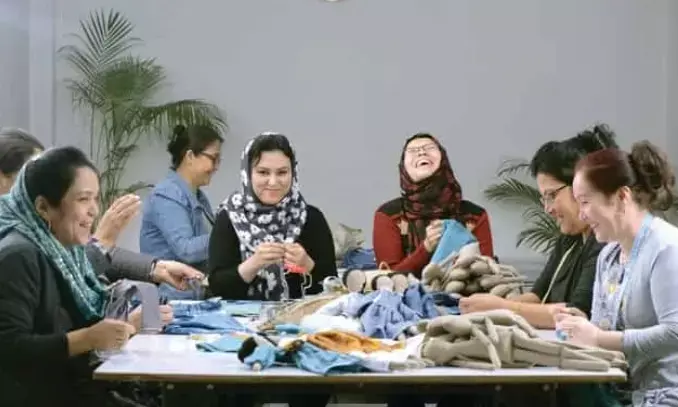'A Stitch At a Time For Freedom'
Afghan women are rebuilding their lives afresh, thanks to Delhi's Silaiwali collective
Najiba Hussaini, a 23-year-old woman from Afghanistan, arrived as a refugee in New Delhi with her family six years ago. It took her almost a year to rebuild her life. "My three years in India are much better than the 20 years that I spent back in Afghanistan", said Hussaini.
According to the United Nations High Commission for Refugees (UNHCR), India has attracted a sizable number of Afghan refugees. India hosts at least 15,806 refugees at the moment. This includes Afghan Hindus, Sikhs, Muslims and Christians. Most of them live in New Delhi, concentrated in the neighbourhoods of Malviya Nagar, Lajpat Nagar and Bhogal.
However, finding a steady and well-paying job in India is challenging, as many of them don't know English or Hindi. Some like Hussaini belong to the Hazara community, which has a long history of persecution. One of the largest ethnic groups in Afghanistan, the Hazaras have endured various forms of oppression like slavery, systematic discrimination and expulsion from their ancestral homes and lands.
Pashtun rulers and governments have historically massacred the Hazara population, making them one of the most persecuted people in the world. Their long-standing persecution intensified due to systematic discrimination and targeted violence from the Taliban and other dominant groups, forcing many to flee to neighbouring countries like India.
Hussaini carries the responsibility of her family of six on her shoulders. "Both my parents are suffering from many health issues, and stay at home," she explained. In Kabul, she worked in a factory for almost nine years. After coming to India, she completed a six-month course to enhance her embroidery and craft skills.
"In Afghanistan, women don't have the freedom to work, or even go out wearing clothes of their choice," said Hussaini. This has been the reason for her to stay back in India. Now she has also found a way to earn a living.
At 'Silaiwali', a collective of Afghan women refugees in Delhi's Malviya Nagar, Hussaini and her friends create beautiful keepsake dolls, and earn a decent living. They take inspiration from the cultures of their homeland to stitch the dolls, clad in traditional Afghan dresses. These are made from cotton scraps and upcycled waste fabric.
These handmade dolls are sold at various stores in Delhi, Mumbai, Goa, Kolkata and Bengaluru. The dolls are also marketed online on the Silaiwali website. The price ranges from Rs 500 to Rs 3500. The dolls showcase diversity, have different 'skin tones' and have a universal appeal. The idea of creating these dolls in different skin tones was to convey that they are designed to celebrate the various races and cultures.
The concept for 'Silaiwali' came to Iris, a French citizen and textile designer, when she was working with Afghan refugees in early 2018. She and her partner Bishwadeep Moitra, a former journalist, observed the Afghan women's skills in sewing, and embroidery and wanted to create a space for them to nurture it further. They approached the UNHCR with the idea, and now the United Nations agency helps them market and sell the dolls. Their motto – "A Stitch Against Waste. A Stitch For Freedom" underlines their mission, environment and solidarity.
For Iris and Moitra, it made sense from a designer's perspective to make dolls, as most of the waste fabrics they sourced from Delhi's garment manufacturers was in the form of scraps. The team brings the fabric to the studio and makes dolls representing various races and traditions. Silaiwali avoids the usage of artificial dyes or colours. They have also started making soft-toys such as elephants, camels and bunnies, to diversify their product catalogue.
'Silaiwali' currently provides work opportunities to around 80 women, many of whom are sole breadwinners of their families. "India is a far more liberal country. The Hazara women value this liberty, and can move around, wear clothes they are comfortable in, and exercise many freedoms that are prohibited to them under the strict regime back in Afghanistan, which is very anti-woman. That is the big reason for them to continue living in India," said Bishwadeep Moitra.
These Hazara women are building their lives afresh in a foreign land, which they have now adopted as their own. Many had to learn new skills and languages, but they did not give up. Every day, they come to the studio to learn and create new things every day. "While we stitch these dolls to life, we stitch our lives back to freedom," said the Afghan refugees working at 'Silaiwali'.





